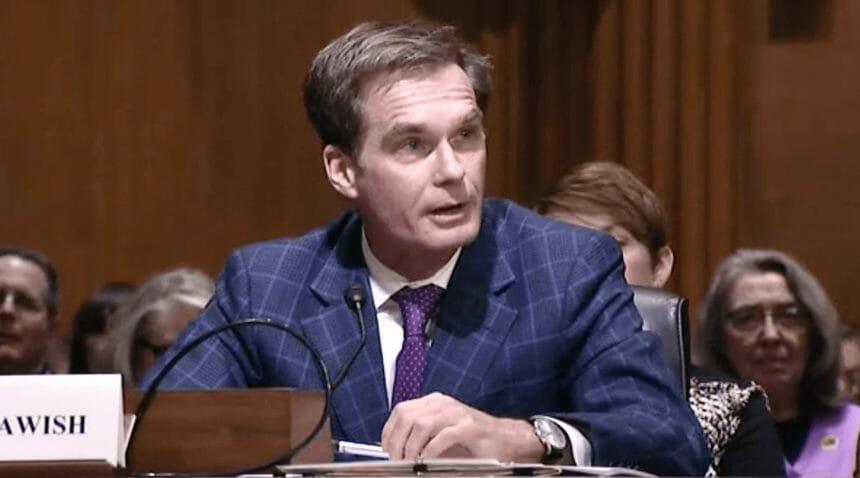
A “better business model for the diagnosis and care of persons with Alzheimer’s disease” needs to be created, Jason Karlawish, M.D., said Wednesday at a Senate Finance Committee Subcommittee on Health hearing.
“The majority of persons with Alzheimer’s disease are over 65 and so covered under Medicare,” said the professor and co-director of the Penn Memory Center at the University of Pennsylvania, Philadelphia. “Medicare, therefore, has a key role in shaping the business model for the care of persons with Alzheimer’s disease.”
The hearing was called by committee Chair Patrick J. Toomey (R-PA) and Debbie Stabenow (D-MI), ranking member, timed to coincide with National Alzheimer’s Disease Awareness Month. Toomey, who said his father and grandfather had the disease, is co-chair of the Bipartisan Congressional Task Force on Alzheimer’s Disease.
Karlawish, as had a witness at a House Ways and Means Committee hearing last week, raised the point that, as of 2017, less than 1% of Medicare beneficiaries living with dementia received comprehensive care planning despite the fact that clinicians that year began being able to obtain reimbursement for providing such care planning if they use the proper CPT code.
“We must study who is using this code and who is not, why and how well it works,” he said. “We should do this with the same urgency as our studies of Alzheimer’s biomarkers.”
Robert Egge, chief public policy officer of the Alzheimer’s Association, told the House committee last week that dementia-specific care planning can improve care, quality of life and medication management as well as reduce hospitalizations and emergency department visits.
Karlawish said that his preliminary research suggests that some Medicare Advantage plans are not paying for care planning; that primary care physicians need more instruction on how to spread the work out over several visits; that Medicare should study how to integrate the code into its Comprehensive Primary Care Plus initiative; that the code should recognize that many of the services for dementia care are delivered by nurses, social workers and community health workers; and that Medicare should consider reimbursing for ongoing care management services.
Karlawish also pointed to the “scarcity of physicians skilled in making and disclosing a diagnosis and discussing a treatment plan with a person living with dementia or mild cognitive impairment and their caregiver.”
People with cognitive decline who sought care from a specialist such as a neurologist, psychiatrist or geriatrician had a shorter time to receive a diagnosis of Alzheimer’s disease and had lower Medicare costs in the year after receiving a diagnosis of Alzheimer’s than those whose disease was diagnosed by a non-specialist, he said. But there are shortages of geriatricians, geriatric psychiatrists and neurologists, and primary care doctors “struggle” to make the diagnoses and treat people with mild cognitive impairment or dementia, Karlawish added.
“Simply put, we’re not going to ‘drug our way out’ of this complicated problem. We are going to need to care for each other,” he said. “Care for persons living with Alzheimer’s disease needs to improve.”
| For more information on cognitive assessment and care planning services,
see this Alzheimer’s Association document. |
Another of the four witnesses, Marc A. Cohen, Ph.D., co-director of the LeadingAge LTSS Center @UMass Boston, told the senators and others at the hearing that the affordability and accessibility of private long-term care insurance could be improved.
“[P]remium levels are now out of the financial reach of most middle-class Americans. …But affordability is not the only challenge,” he said. “Confusion about public and private roles in paying for costs, myopia, mistrust of the insurance industry, adverse selection and high selling costs have all contributed to declining sales of private policies.”
Additionally, Cohen said, consumers may misperceive their own risks of needing long-term services and supports, have difficulty considering the future implications of the choices they make now, underestimate the costs of such services and not understand the degree to which existing programs do or do not offer coverage against those risks. And some may prefer Medicaid-financed care, he added.
“[A] joint-public-private approach [to long-term care financing] is most likely to move the needle and make a difference for middle class people,” he said. “Clearly, those families who will face the difficult issue of paying for Alzheimer’s or related dementias would benefit the most from being insured when such an event happens, and we should keep them in mind when we consider steps to improve the market.”
Toomey said he said he’s working on a bill to help families with the cost of long-term care. Stabenow said she has introduced several pieces of legislation designed to help with dementia detection, care planning and support of people living with dementia, their family members and those who care for them.



